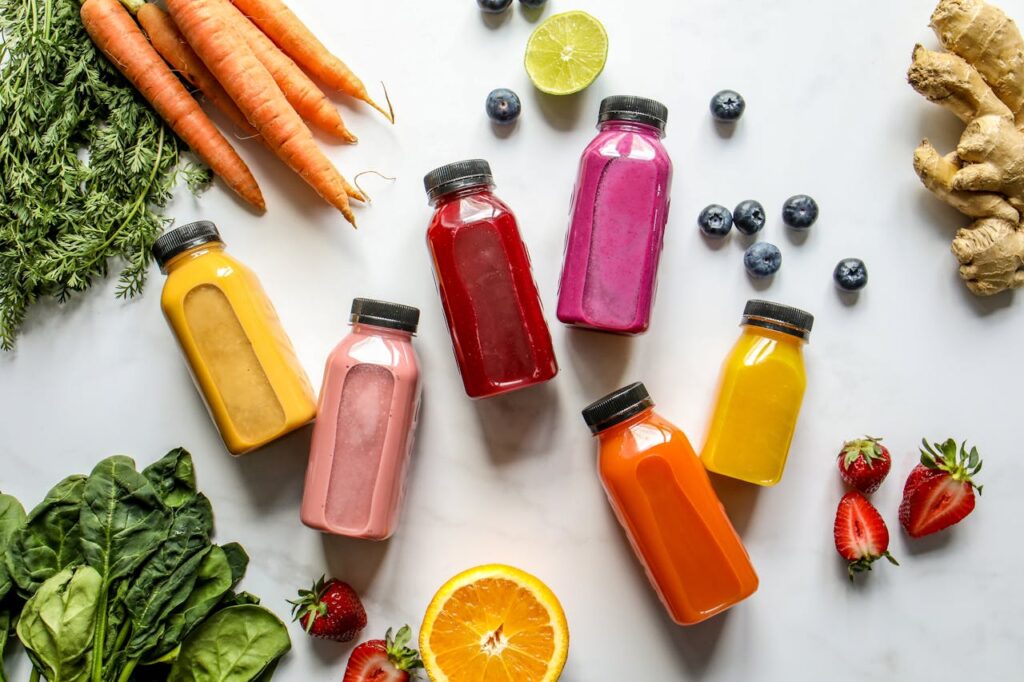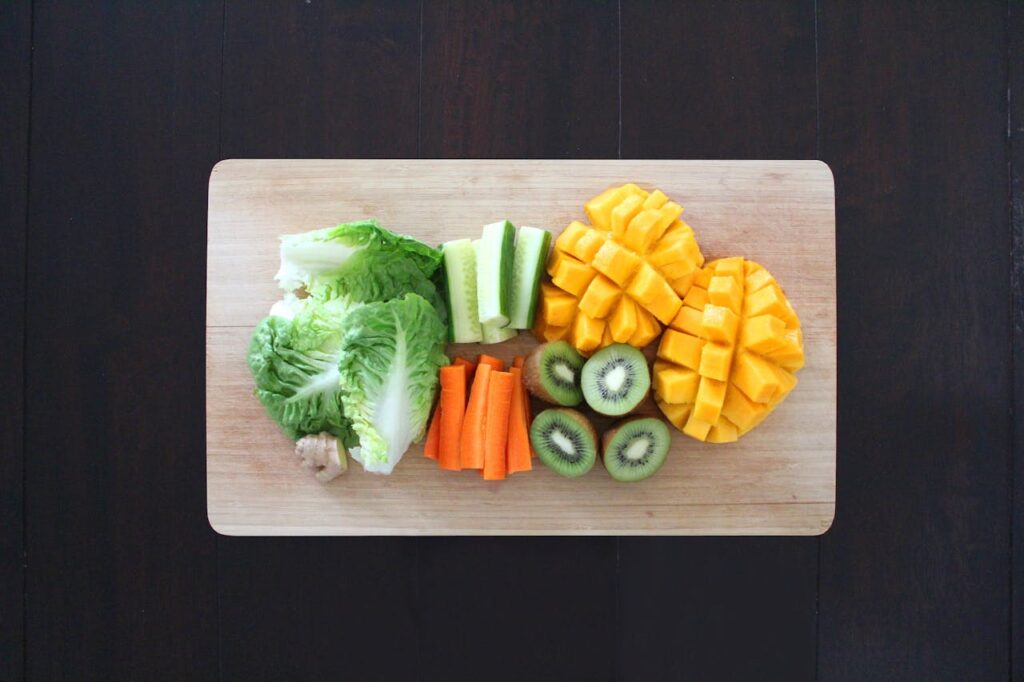Many foods marketed as healthy are not as beneficial as they appear. Clever advertising and labels with words like “natural,” “multi-grain,” or “low-fat” can trick shoppers into believing they are making smart choices. In reality, many of these foods are highly processed, full of hidden sugars, or stripped of essential nutrients. Choosing them regularly can lead to weight gain, poor energy levels, and long-term health problems. To cut through the confusion, here are seven fake health foods you should avoid and seven real superfoods that deserve a permanent place in your diet.
Smoothies
Store-bought smoothies are often little more than sugar in a cup. Many contain fruit juice concentrate, added sweeteners, and very little fiber, which makes them behave in the body much like soda. A single bottle can contain more sugar than a candy bar, despite being labeled as “all natural.” The lack of fiber also means the sugar is absorbed quickly, causing blood sugar spikes followed by crashes. While homemade smoothies with vegetables and unsweetened fruit can be healthy, pre-packaged ones are usually a poor choice.
Fruit Juice
Fruit juice is one of the most misleading products in the health food aisle. Even juices labeled 100 percent pure are problematic because juicing removes the fiber that slows sugar absorption. Without fiber, the body processes the natural sugars rapidly, which can raise blood sugar levels and strain insulin response. Drinking juice also makes it easy to consume far more calories than eating whole fruit, since it takes several oranges to make a single glass. Over time, this habit can contribute to weight gain and metabolic issues.

Veggie Chips
Veggie chips are marketed as a lighter, healthier alternative to regular chips, but most brands are not much different nutritionally. They are often made with potato starch, corn flour, or a vegetable powder blend, meaning the actual vegetable content is minimal. Many are fried in oils and loaded with salt, which makes them nearly identical to conventional chips. The vitamins and antioxidants naturally found in vegetables are usually destroyed in the processing. The end product offers crunch, but not much nutrition.
Granola Bars
Granola bars carry a reputation as a wholesome, energy-boosting snack, but many are closer to candy bars in disguise. They often contain high fructose corn syrup, chocolate coatings, and refined grains that make them calorie-dense but nutrient-poor. Some bars pack more than 20 grams of sugar, which is nearly an entire day’s recommended intake in a single snack. Instead of providing steady fuel, these bars can cause energy spikes followed by sluggishness. They are convenient, but far from a real health food.
Multi-Grain Bread
The label “multi-grain” is one of the biggest tricks in the bread aisle. Many multi-grain loaves are made with refined white flour as the main ingredient, with a sprinkling of seeds or grains added for marketing appeal. The refining process removes fiber and key nutrients, leaving bread that raises blood sugar quickly and does not keep you full. Unless the package specifically says “100 percent whole grain,” the benefits are limited. Eating multi-grain bread often means missing out on the nutritional value of real whole grains.
Honey
Honey is frequently advertised as a natural sweetener, but nutritionally it is not much different from sugar. While it contains small amounts of minerals and antioxidants, the levels are too low to make a meaningful difference. Honey is still made up of glucose and fructose, which can raise blood sugar and contribute to calorie excess when consumed in large amounts. Some people believe it is healthier than table sugar, but the body processes it in nearly the same way. Using it sparingly is fine, but treating it as a superfood is misleading.

Plant-Based Milk
Plant-based milks have become popular, but many varieties are highly processed and not as nutritious as people think. Almond, oat, or rice milk often contain stabilizers, gums, and added sugars that reduce their health value. Many are low in protein compared to cow’s milk or soy milk, which makes them less filling. Unless fortified, they can also lack important nutrients like calcium and vitamin D. Choosing unsweetened and fortified versions can make them healthier, but not all plant-based milks live up to their image.
7 Healthy Foods to Eat Instead
Instead of relying on foods that look healthy but are nutritionally weak, you can choose real superfoods that naturally provide the vitamins, minerals, and antioxidants your body needs. These foods are whole, minimally processed, and supported by strong evidence for their health benefits. Adding them to your diet can improve energy, immunity, and long-term wellness.
Leafy Greens
Leafy greens like spinach, kale, and Swiss chard are among the most nutrient-rich foods you can eat. They provide vitamins A, C, and K, as well as minerals like calcium, iron, and magnesium. Their high antioxidant content helps protect cells from damage and reduces inflammation in the body. Greens are also high in fiber, which supports digestion and helps regulate blood sugar. Eating them raw in salads, lightly sautéed, or blended into smoothies is one of the easiest ways to improve your diet.
Whole Fruits
Whole fruits such as apples, pears, and berries provide natural sweetness along with fiber that slows sugar absorption. Unlike juice, eating fruit delivers water, antioxidants, and phytochemicals in a balanced package. The fiber content keeps you feeling full and supports gut health. Fruits also provide vitamin C, potassium, and other key nutrients that help the immune system function properly. Making fruit a daily habit is an easy way to protect your long-term health.

Roasted Vegetables
Roasting vegetables like carrots, zucchini, and sweet potatoes not only enhances flavor but also preserves nutrients. These vegetables are rich in vitamins, minerals, and dietary fiber that promote good digestion and steady energy levels. Cooking with a small amount of olive oil adds healthy fats that help the body absorb fat-soluble vitamins. Unlike processed veggie chips, roasted vegetables offer both crunch and nutrition. They can serve as a versatile side dish or a satisfying snack.
Raw Nuts
Raw nuts, including almonds, walnuts, and cashews, provide a concentrated source of healthy fats, protein, and fiber. They help regulate appetite by keeping you full for longer, making them an excellent alternative to sugary snacks. Nuts are also linked to improved heart health thanks to their omega-3 fatty acids and antioxidants. Regular consumption has been associated with lower cholesterol and reduced risk of heart disease. Eating a small handful daily is a simple way to get these benefits.
Whole Grain Bread
Whole grain bread is made using the entire grain kernel, meaning it retains fiber, vitamins, and minerals. Unlike multi-grain bread, it does not rely on marketing tricks to appear healthy. Eating whole grains supports digestive health, stabilizes blood sugar, and helps maintain energy throughout the day. They also provide B vitamins that are essential for metabolism and cell function. Choosing bread labeled “100 percent whole grain” ensures you are getting the full benefits.
Berries
Berries such as blueberries, raspberries, and strawberries are true superfoods with low sugar content and high antioxidant power. They contain compounds that protect against oxidative stress, which plays a role in aging and chronic disease. Berries also support brain health and have been linked to better memory and focus. Their fiber content helps control hunger while promoting healthy digestion. Adding them to oatmeal, yogurt, or smoothies is an easy way to increase your nutrient intake.
Fermented Dairy or Soy
Fermented dairy products like kefir and yogurt, as well as unsweetened soy milk, are excellent for gut health. They provide probiotics that support a balanced microbiome, which is linked to better digestion and stronger immunity. These foods also supply protein, calcium, and vitamin D that are crucial for bone and muscle health. Unlike heavily processed plant-based milks, they offer nutrients in natural and bioavailable forms. Choosing unsweetened varieties ensures you get the benefits without added sugar.

The Bottom Line
Fake health foods like smoothies, fruit juice, and granola bars may look appealing, but they often hide sugar and processing that do more harm than good. By swapping them for leafy greens, berries, nuts, and other true superfoods, you can fuel your body with real nutrition. These swaps are not about dieting but about giving your body what it needs to thrive. Over time, choosing whole, nutrient-dense foods will improve energy, strengthen immunity, and support long-term health far more than any packaged “health” product ever could.
Disclaimer: This article was created with AI assistance and edited by a human for accuracy and clarity.

